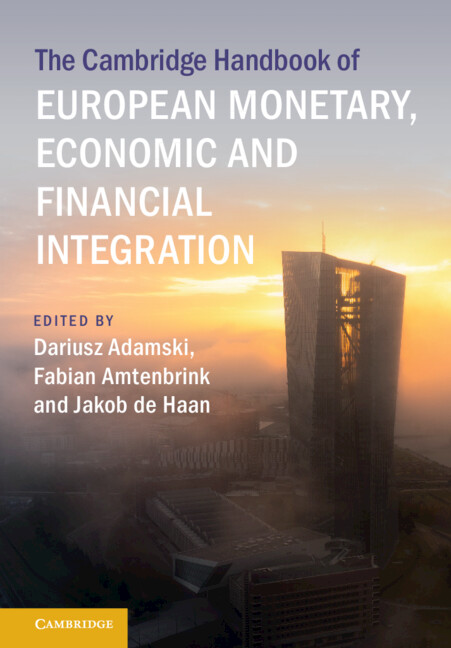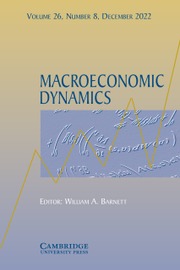The Cambridge Handbook of European Monetary, Economic and Financial Integration
This Handbook provides a comprehensive analysis of the past, present, and future of the European Economic and Monetary Union in its broader context. It incorporates economic, legal and political science perspectives to provide an in-depth and forward-looking scrutiny of the rationales, the main features and the shortcomings of the economic, monetary and financial integration in the euro area. Studying its complex, highly interconnected governance structures, the authors suggest directions for necessary reforms. With contributions from a diverse group of leading experts in their fields, this volume is truly versatile in its scope and approach, whilst remaining accessible for readers of different academic backgrounds.
- Provides an interdisciplinary and multi-disciplinary analysis of the current system governing European Economic and Monetary Union and finds solutions to the main problems that are being identified in the system
- Offers a discussion of the political, economic, and legal rationale for the introduction of European EMU and for the main features of the governance framework
- Provides an overview, backed up by detailed discussions, of the main issues at play concerning the conduct of the single monetary policy by the ECB in the euro area
Product details
October 2023Hardback
9781009364690
800 pages
262 × 185 × 37 mm
1.3kg
Available
Table of Contents
- Part I. The Economic and Monetary Union: Political, Economic and Legal Rationales:
- 1. Conceptual foundations of economic and monetary union: the economic dimension Barry Eichengreen
- 2. Theorizing economic and monetary union – between concepts and pragmatism Amy Verdun
- 3. Monetary union and the single currency Harold James
- 4. On the misalignment of monetary, economic and political integration in European economic and monetary union Fabian Amtenbrink
- 5. Ideas, interests, and power: Germany's complex balancing act in the process of economic and monetary union in Europe Kenneth Dyson
- 6. Coping with economic crises through learning by doing: an evolving policy response Iain Begg
- 7. The political economy of reinsurance Waltraud Schelkle
- 8. Euro crises, the productivity slowdown and the EMU Nauro F. Campos
- Part II. The Monetary Dimension:
- 9. The overburdened monetary policy mandate of the ECB Dariusz Adamski
- 10. Government bond buying by the European Central Bank: leadership versus accountability Michele Chang
- 11. ECB monetary policies: the increasing importance of communication Jakob de Haan
- 12. From market to green economics: impact on monetary and financial policies Dirk Schoenmaker and Hans Stegeman
- 13. The politics of monetary union and the democratic legitimacy of the ECB as a strategic actor Sebastian Diessner
- 14. How can courts contribute to accountability in EU monetary policy? Ana Bobić and Mark Dawson
- Part III. The Economic and Fiscal Dimensions:
- 15. Reviving the case for policy coordination in EMU Maria Demertzis, Marta Domínguez Jiménez and Nicola Viegi
- 16. Ten years of the European semester: from sovereign debt crisis to COVID-19 Crisis Edgars Eihmanis
- 17. The EU fiscal rules: principle, policy and reform prospects Menelaos Markakis
- 18. National fiscal policy in EMU: insufficient sustainability and stabilisation? Jakob de Haan and Bram Gootjes
- 19. The politics of fiscal integration in Eurozone reforms and next generation EU Fabio Wasserfallen
- 20. Adjustments in economic crises: the different outcomes of the sovereign debt and pandemic crises in Europe Sergio Fabbrini and Andrea Capati
- 21. Designing a permanent EU-wide stabilisation facility Roel Beetsma and George Kopits
- 22. Enhancing private and public risk-sharing: lessons from the Literature and Reflections on the Covid-19 crisis Jacopo Cimadomo, Esther Gordo Mora and Alessandra Anna Palazzo
- Part IV. Financial Integration:
- 23. Banking regulation in Europe: from reaction to thinking ahead Katarzyna Parchimowicz
- 24. The politics behind the creation of the banking union Elena Ríos Camacho
- 25. Failing banks within the banking union at the crossroads: a great step forward – with many loose ends Jens-Hinrich Binder
- 26. The banking union: supervision and crisis management Willem Pieter de Groen
- 27. The reemergence of market-based finance? The politics of capital markets union Giuseppe Montalbano and Markus Haverland
- 28. The European strategy on digital finance and its interplay with capital markets integration in the EU Diego Valiante, Marco Lamandini and David Ramos Muñoz
- 29. Regulating crypto and cyberware in the EU Karel Lannoo.





.jpg)

